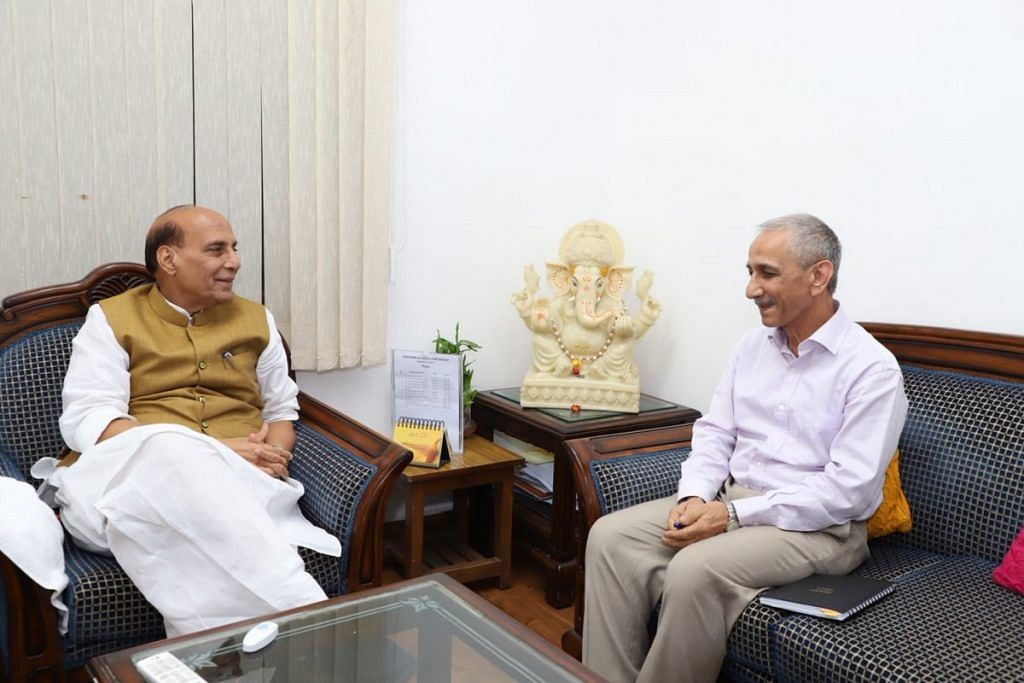Home Minister Rajnath Singh said government’s new interlocutor on Kashmir would initiate a dialogue “to understand the legitimate aspirations of people”.
New Delhi: Union Home Minister Rajnath Singh’s announcement to start a “sustained dialogue” in Jammu and Kashmir on Monday received mixed reactions, with his reference to “legitimate aspirations” of the people being seen as a pre-condition by many.
“As a representative of the Government of India, former director of the IB (Intelligence Bureau), Dineshwar Sharma, will initiate a sustained interaction and dialogue to understand the legitimate aspirations of people in Jammu and Kashmir,” Singh said at a hurriedly-convened press conference.
The announcement by the Home minister comes days after the Hurriyat blamed the Centre for not making the effort to start an unconditional dialogue.
Also read: Hurriyat blames Centre for Kashmir dialogue stalemate
Partner PDP welcomes it
The decision has come as a boost for the state government, and Chief Minister Mehbooba Mufti welcomed the announcement. “We welcome the step, it is the need of the hour,” she said.
Addressing a press conference in Srinagar, Mufti said it is an extension of what Prime Minister Narendra Modi said on Independence Day. Calling it a “confidence-building measure”, Mufti said: “I hope the stakeholders will also come forward so that the people of Kashmir who are in trouble due to the bloodshed are taken out of it.”
Other leaders from Mufti’s Peoples Democratic Party (PDP) also expressed confidence over the initiative.
Naeem Akhtar, senior leader and minister for public works in the J&K government, said: “It was an important part of our agenda.”
He, however, downplayed talk of “pre-conditions” in the announcement by the Home minister and said “it clearly has no limitation in reaching out to all the stakeholders, and was necessary step for the state”.
The opposing view
Former CM and National Conference working president Omar Abdullah was more reserved in his praise, but did greet the move positively.
“The acceptance of the political nature of the #Kashmir issue is a resounding defeat of those who could only see use of force as a solution,” he tweeted.
Abdullah, however, questioned the formulation of the term “legitimate aspirations”.
“The ‘legitimate aspirations’ of people of J&K is an interesting formulation. Who gets to decide what is legitimate?” Abdullah tweeted.
Speaking to ThePrint, NC spokesperson Junaid Azim Mattu said while the party welcomed the development, some pertinent questions needed to be answered by the Centre.
“First, what do they mean by ‘legitimate’ demands? Do they mean talks strictly within the ambit of the Indian Constitution? And what happens to the report submitted by the previous interlocutor, Dileep Padgaonkar?” Mattu asked.
He added that the government must elaborate on whether it is going to include the detained Hurriyat leaders in the talks. While he felt that “skepticism must go away”, Mattu said there had been a substantial process earlier with respect to interlocutors, and thus, “these questions are a must, and deserve an answer”.
Wajahat Habibullah, former chairman of the National Commission for Minorities, and has been engaging in initiatives to reconnect with the valley’s stakeholders over the years, said the development was “an offer with pre-conditions”.
He said the Home minister’s announcement came “randomly”, and was “not well-thought”.
